
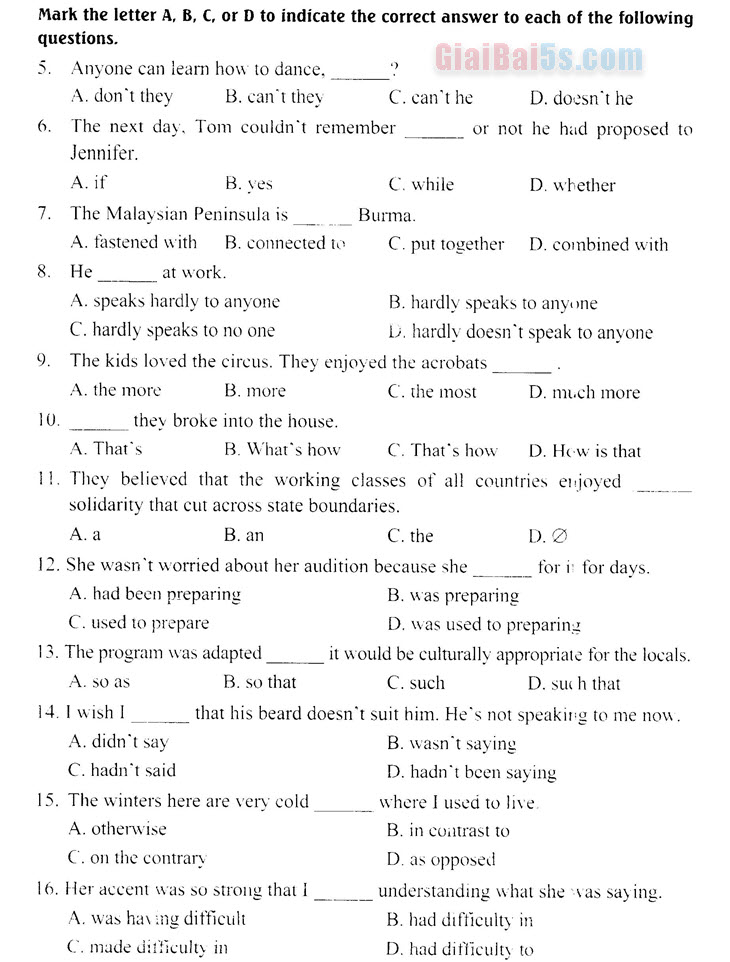
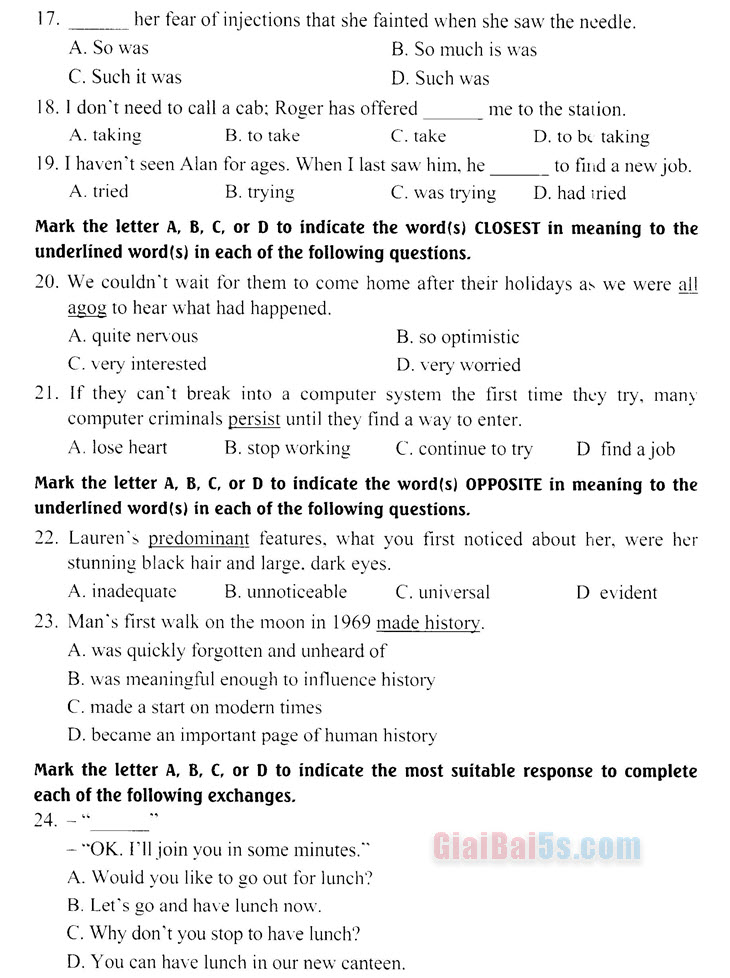
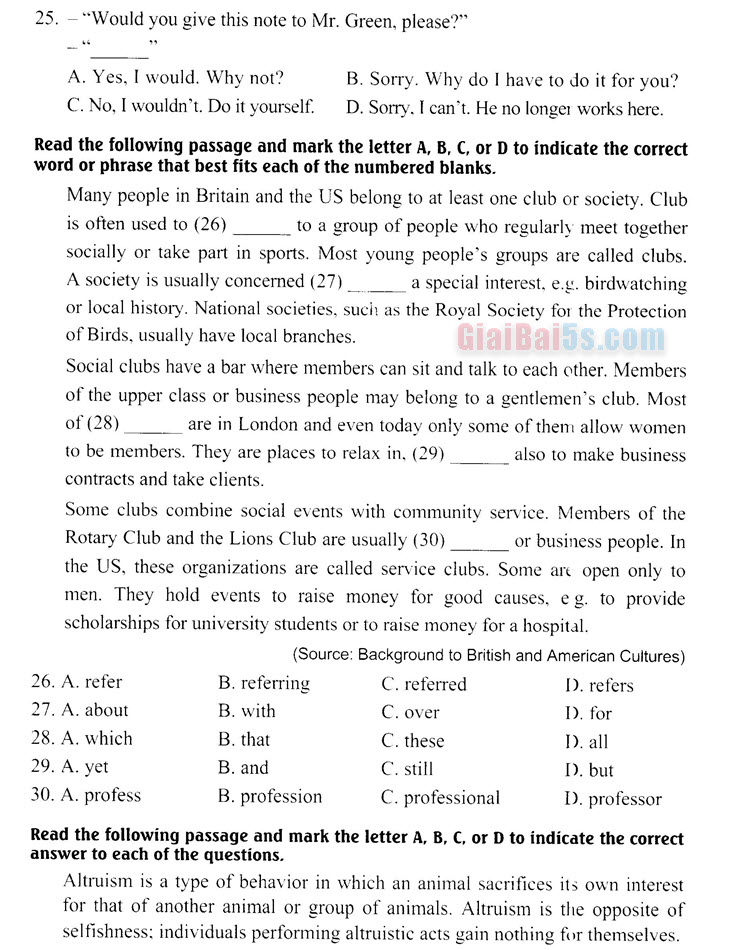
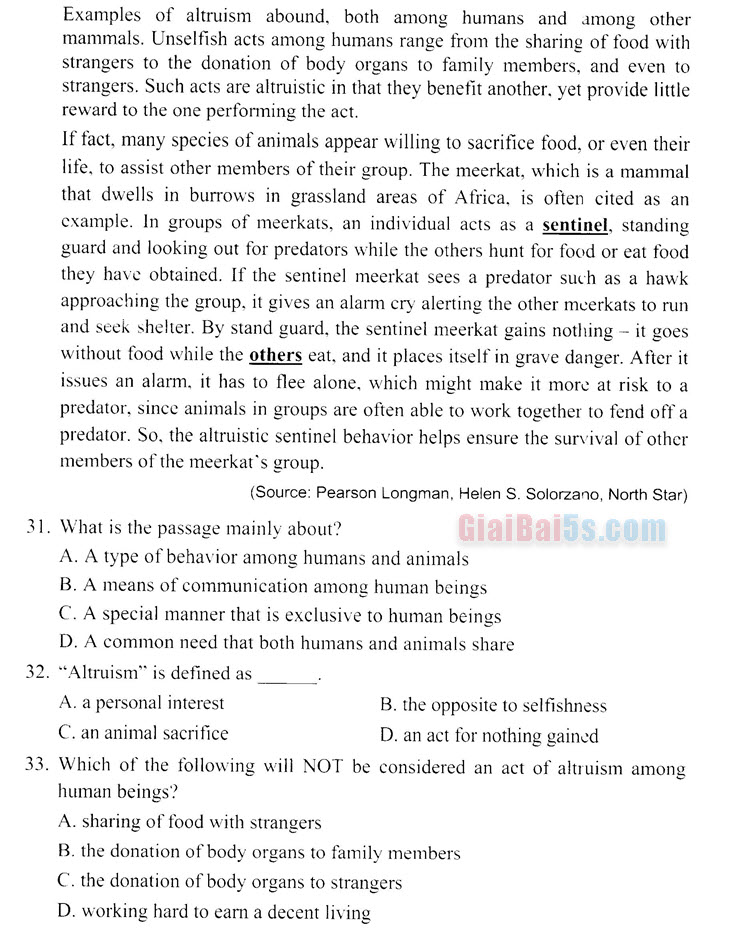
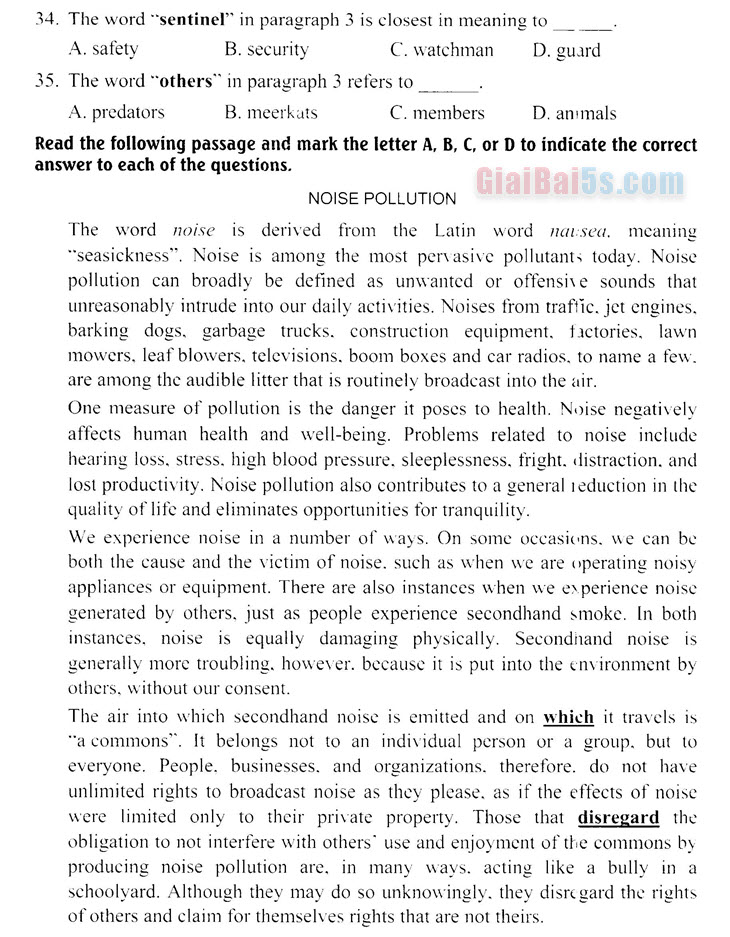
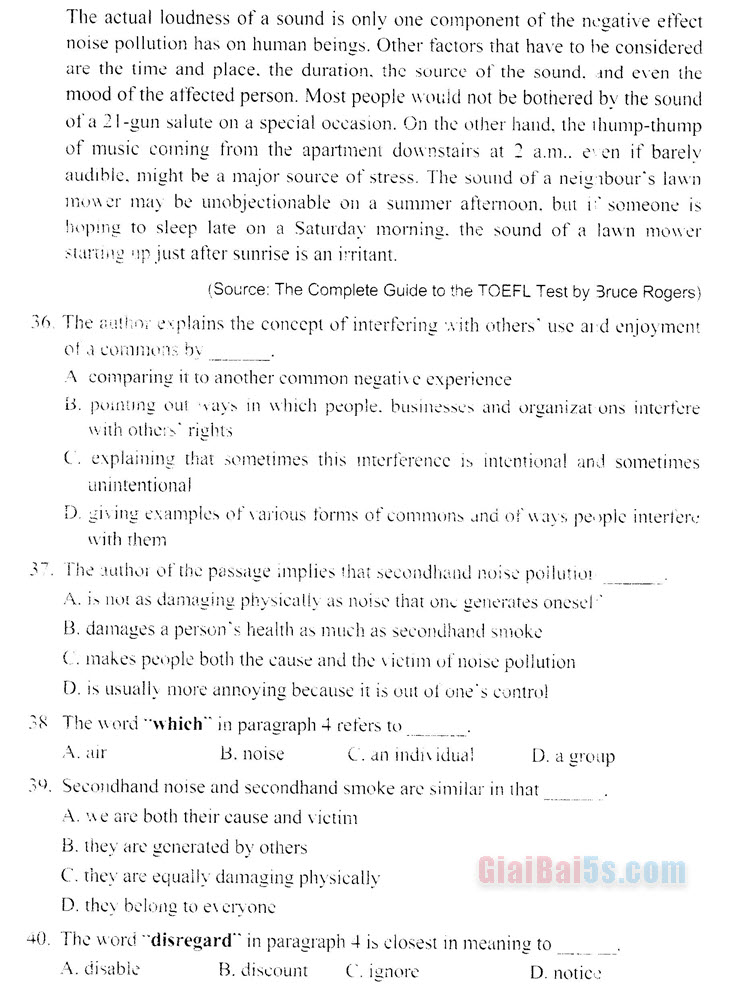
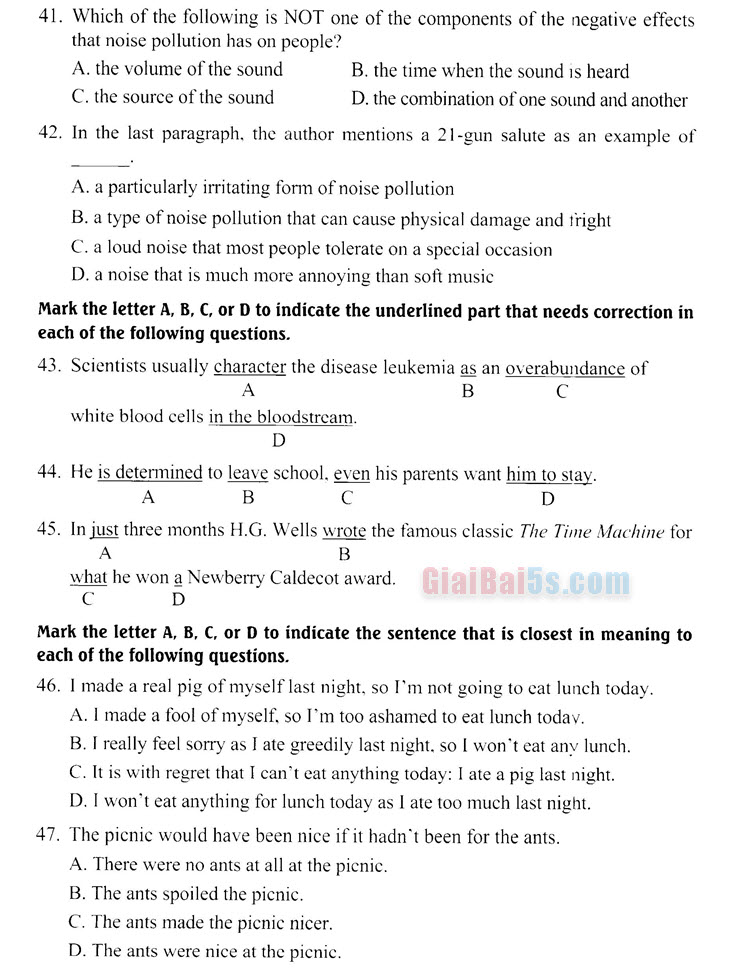
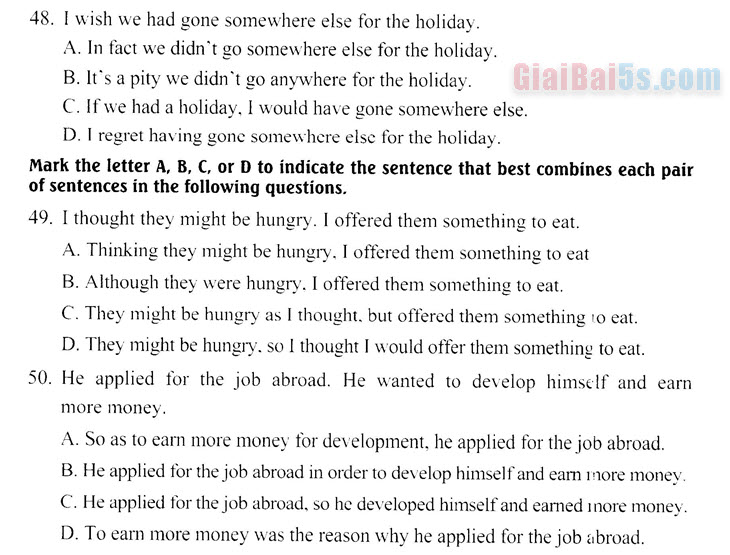

Nguồn website giaibai5s.com
Mark the letter A, B, C, or D to indicate the word whose underlined part differs from the other three in pronunciation in each of the following questions, 1. A. species B. precise
ocean D. efficient 2. A. high
enough
outweigh D. sigh
Mark the letter A, B, C, or D to indicate the word that differs from the other three in the position of primary stress in each of the following questions. 3. A. normal
divide
beauty D. household 4. A. performance B. influence C. musician D. ambition
Mark the letter A, B, C, or D to indicate the correct answer to each of the following questions. 5. Anyone can learn how to dance,
don`t they B. can’t they C.can’t he D . doesn’t he 6. The next day, Tom couldn’t remember or not he had proposed to
Jennifer. A. if B. ves
while
whether 7. The Malaysian Peninsula is Burma.
fastened with B. connected to C. put together D. combined with 8. He_ at work. A. speaks hardly to anyone
hardly speaks to anyone C. hardly speaks to no one
Di hardly doesn’t speak to anyone 9. The kids loved the circus. They enjoyed the acrobats A. the more B. more
the most D. mich more 10. _ they broke into the house.
That’s B. What’s how C. That’s how D. H(w is that 11. They believed that the working classes of all countries enjoyed
solidarity that cut across state boundaries. A. a B. an
DØ 12. She wasn’t worried about her audition because she for i for days. A. had been preparing
was preparing C. used to prepare 13. The program was adapted it would be culturally appropriate for the locals. A. so as B. so that
such
such that 14. I wish I that his beard doesn’t suit him. He’s not speaking to me now. A. didn’t say
wasn’t saying C. hadn’t said
hadn’t been saying 15. The winters here are very cold where I used to live, A. otherwise
in contrast to C.on the contrary
as opposed 16. Her accent was so strong that I _ understanding what she vas saying. A. was having difficult
had difficulty in c. made duliculty in
had difficulty to
the
17.
her fear of injections that she fainted when she saw the needle. A. So was
So much is was C. Such it was
Such was 18. I don’t need to call a cab; Roger has offered to call a cab; Roger has offered
me to the station. A. taking B. to take
take
to be taking 19. I haven’t seen Alan for ages. When I last saw him, he to find a new job. A. tried B. trying
was trying D. had iried Mark the letter A, B, C, or D to indicate the word(s) CLOSEST in meaning to the underlined word(s) in each of the following questions, 20. We couldn’t wait for them to come home after their holidays as we were all
agog to hear what had happened. A. quite nervous
so optimistic C. very interested
very worried 21. If they can’t break into a computer system the first time they try, many
computer criminals persist until they find a way to enter.
lose heart B. stop working C. continue to try D find a job Mark the letter A, B, C, or D to indicate the word(s) OPPOSITE in meaning to the underlined word(s) in each of the following questions. 22. Lauren’s predominant features, what you first noticed about her, were her
stunning black hair and large. dark eyes. A. inadequate B. unnoticeable C. universal
D evident 23. Man’s first walk on the moon in 1969 made history.
was quickly forgotten and unheard of B. was meaningful enough to influence history C. made a start on modern times D. became an important page of human history
Mark the letter A, B, C, or D to indicate the most suitable response to complete each of the following exchanges. 24. – “
– “OK. I’ll join you in some minutes.” A. Would you like to go out for lunch? B. Let’s go and have lunch now. C. Why don’t you stop to have lunch? D. You can have lunch in our new canteen.
– “Would you give this note to Mr. Green, please?”
Yes, I would. Why not? C. No, I wouldn’t. Do it yourself.
Sorry. Why do I have to do it for you? D. Sorry, I can’t. He no longer works here.
Read the following passage and mark the letter A, B, C, or D to indicate the correct word or phrase that best fits each of the numbered blanks.
Many people in Britain and the US belong to at least one club or society. Club is often used to (26)_ _ to a group of people who regularly meet together socially or take part in sports. Most young people’s groups are called clubs. A society is usually concerned (27) a special interest, e.g. birdwatching or local history. National societies, such as the Royal Society for the Protection of Birds, usually have local branches. Social clubs have a bar where members can sit and talk to each other. Members of the upper class or business people may belong to a gentlemen’s club. Most of (28) are in London and even today only some of them allow women to be members. They are places to relax in, (29) also to make business contracts and take clients. Some clubs combine social events with community service. Members of the Rotary Club and the Lions Club are usually (30)_ or business people. In the US, these organizations are called service clubs. Some are open only to men. They hold events to raise money for good causes, eg. to provide scholarships for university students or to raise money for a hospital.
(Source: Background to British and American Cultures) 26. A. refer B. referring C. referred
refers 27. A. about
with C. over
1), for 28. A. which
that C. these
D). all 29. A. yet
and C. still
I). but 30. A. profess
profession C. professional D. professor
Read the following passage and mark the letter A, B, C, or D to indicate the correct answer to each of the questions,
Altruism is a type of behavior in which an animal sacrifices its own interest for that of another animal or group of animals. Altruism is the opposite of selfishness; individuals performing altruistic acts gain nothing for themselves.
Examples of altruism abound, both among humans and among other mammals. Unselfish acts among humans range from the sharing of food with strangers to the donation of body organs to family members, and even to strangers. Such acts are altruistic in that they benefit another, yet provide little reward to the one performing the act. If fact, many species of animals appear willing to sacrifice food, or even their life, to assist other members of their group. The meerkat, which is a mammal that dwells in burrows in grassland areas of Africa, is often cited as an example. In groups of meerkats, an individual acts as a sentinel, standing guard and looking out for predators while the others hunt for food or eat food they have obtained. If the sentinel meerkat sees a predator such as a hawk approaching the group, it gives an alarm cry alerting the other meerkats to run and seek shelter. By stand guard, the sentinel meerkat gains nothing – it goes without food while the others eat, and it places itself in grave danger. After it issues an alarm, it has to flee alone, which might make it more at risk to a predator, since animals in groups are often able to work together to fend off a predator. So, the altruistic sentinel behavior helps ensure the survival of other members of the meerkat’s group.
(Source: Pearson Longman, Helen S. Solorzano, North Star)
What is the passage mainly about?
A type of behavior among humans and animals B. A means of communication among human beings C. A special manner that is exclusive to human beings
A common need that both humans and animals share 32. “Altruism” is defined as A. a personal interest
the opposite to selfishness C. an animal sacrifice
an act for nothing gained 33. Which of the following will NOT be considered an act of altruism among
human beings? A. sharing of food with strangers B. the donation of body organs to family members C. the donation of body organs to strangers D. working hard to earn a decent living
- The word “sentinel” in paragraph 3 is closest in meaning to
- safety B. security C. watchman D. guard 35. The word “others” in paragraph 3 refers to
- predators B. meerkats C. members D. an mals Read the following passage and mark the letter A, B, C, or D to indicate the correct answer to each of the questions.
NOISE POLLUTION The word noise is derived from the Latin word na: sea, meaning “seasickness”. Noise is among the most pervasive pollutants today. Noise pollution can broadly be defined as unwanted or offensive sounds that unreasonably intrude into our daily activities. Noises from traftic, jet engines, barking dogs, garbage trucks, construction equipment, factories, lawn mowers, leaf blowers, televisions, boom boxes and car radios, to name a few. are among the audible litter that is routinely broadcast into the air. One measure of pollution is the danger it poses to health. Noise negatively affects human health and well-being. Problems related to noise include hearing loss, stress, high blood pressure, sleeplessness, fright, distraction, and lost productivity. Noise pollution also contributes to a general reduction in the quality of life and eliminates opportunities for tranquility. We experience noise in a number of ways. On some occasions, we can be both the cause and the victim of noise, such as when we are operating noisy appliances or equipment. There are also instances when we experience noise generated by others, just as people experience secondhand smoke. In both instances, noise is equally damaging physically. Secondiiand noise is generally more troubling, however, because it is put into the environment by others, without our consent. The air into which secondhand noise is emitted and on which it travels is “a commons”. It belongs not to an individual person or a group, but to everyone. People, businesses, and organizations, therefore, do not have unlimited rights to broadcast noise as they please, as if the effects of noise were limited only to their private property. Those that disregard the obligation to not interfere with others’ use and enjoyment of the commons by producing noise pollution are, in many ways. acting like a bully in a schoolyard. Although they may do so unknowingly, they disregard the rights of others and claim for themselves rights that are not theirs.
The actual loudness of a sound is only one component of the negative effect noise pollution has on human beings. Other factors that have to be considered are the time and place, the duration, the source of the sound, and even the mood of the affected person. Most people would not be bothered by the sound of a 21-gun salute on a special occasion. On the other hand, the thump-thump of music coming from the apartment downstairs at ? a.m.. een if barely audible, might be a major source of stress. The sound of a neig ibour’s lawn moner may be uobjectionable on a summer afternoon, but i someone is hoping to sleep late on a Saturday morning, the sound of a lawn mower starung up just after sunrise is an irritant.
(Source: The Complete Guide to the TOEFL Test by Bruce Rogers)
The author explains the concept of interfering with others’ use and enjoyment
of a Commons by A comparing it to another common negative experience B. ponung out ways in which people, businesses and organizat ons interfere
with other rights ( explaining that sometimes this interference is intentional and sometimes
unintentional D giving examples of various forms of commons und of wais peuple interteri
with them
The author of the passage implies that secondhand noise pollution
is not as damaging physically as noise that one generates onesel B. damages a person’s liealth as much as secondhand smoke Cimakes people both the cause and the victim of noise pollution
is usually more annoying because it is out of one’s control 38 The word “which“ in paragraph 4 refers to 4. air
noise C. an individual D. a group 99. Secondhand noise and secondhand smoke are similar in that
He are both their cause and victim B. they are generated by others C. they are equally damaging physically
they belong to everyone 40. The word “disregard” in paragraph is closest in meaning to A. disable B. discount C. ignore
notice
- Which of the following is NOT one of the components of the negative effects
that noise pollution has on people? A. the volume of the sound B. the time when the sound is heard C. the source of the sound
- the combination of one sound and another
- In the last paragraph, the author mentions a 21-gun salute as an example of
- a particularly irritating form of noise pollution B. a type of noise pollution that can cause physical damage and fright C. a loud noise that most people tolerate on a special occasion D. a noise that is much more annoying than soft music
Mark the letter A, B, C, or D to indicate the underlined part that needs correction in each of the following questions. 43. Scientists usually character the disease leukemia as an overabundance of
white blood cells in the bloodstream.
- He is determined to leave school, even his parents want him to stay. A B
C 45. In just three months H.G. Wells wrote the famous classic The Time Machine for
what he won a Newberry Caldecot award. C
D Mark the letter A, B, C, or D to indicate the sentence that is closest in meaning to each of the following questions, 46. I made a real pig of myself last night, so I’m not going to eat lunch today.
I made a fool of myself, so I’m too ashamed to eat lunch today. B. I really feel sorry as I ate greedily last night, so I won’t eat any lunch. C. It is with regret that I can’t eat anything today: I ate a pig last night.
I won’t eat anything for lunch today as I ate too much last night. 47. The picnic would have been nice if it hadn’t been for the ants.
There were no ants at all at the picnic. B. The ants spoiled the picnic. C. The ants made the picnic nicer. D. The ants were nice at the picnic.
- I wish we had gone somewhere else for the holiday.
- In fact we didn’t go somewhere else for the holiday. B. It’s a pity we didn’t go anywhere for the holiday. C. If we had a holiday, I would have gone somewhere else.
- I regret having gone somewhere else for the holiday. Mark the letter A, B, C, or D to indicate the sentence that best combines each pair of sentences in the following questions, 49. I thought they might be hungry. I offered them something to eat.
- Thinking they might be hungry, I offered them something to eat B. Although they were hungry, I offered them something to eat. C. They might be hungry as I thought, but offered them something to eat.
- They might be hungry, so I thought I would offer them something to eat. 50. He applied for the job abroad. He wanted to develop himself and earn
more money. A. So as to earn more money for development, he applied for the job abroad. B. He applied for the job abroad in order to develop himself and earn more money, C. He applied for the job abroad, so he developed himself and earned inore money. D. To earn more money was the reason why he applied for the job abroad.
- B 14. 24. B 34. 44.
5.B 15. B 25. D 35. B 45.
6.D 16. B 26. A 36. A 46. D
7.B 17. D 27. B 37. D 47. B
8.B 18. B 28.C 38. A 48. A
9.C 19.0 29. D 39.B 49. A
10.C 20.C 30.0 40.C 50. B
